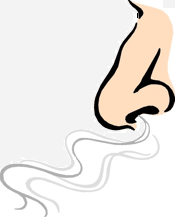 As we mentioned earlier on our journey, mold is everywhere. It can be found on just about any surface, even in the air we breathe. Mold has been on this planet long before humans. You might think that we have developed a tolerance to it over time and you are right. Humans have learned to adapt to the presence of mold but we are free from its harmful effects. One of our best defense mechanisms when it comes to detecting the presence of mold is our noses.
As we mentioned earlier on our journey, mold is everywhere. It can be found on just about any surface, even in the air we breathe. Mold has been on this planet long before humans. You might think that we have developed a tolerance to it over time and you are right. Humans have learned to adapt to the presence of mold but we are free from its harmful effects. One of our best defense mechanisms when it comes to detecting the presence of mold is our noses.
When mold is present, it will produce something that we in the business call MVOC’s. This stands for Microbial Volatile Organic Compounds but you don’t need to be concerned with what those are. What you should know though is that these MVOC’s produce a very distinct smell that is best described as musty or earthy. You might relate it to decaying wood or wet, dirty socks.
If you think your nose has detected mold but you are not 100% sure, the best way to double check is to step outside and get a good amount of fresh air. This will cleanse your pallet. When you step back into the room/area in question, if you smell that earthy, musty smell again, you may have mold. This can always be confirmed though with a simple mold inspection.
Learn everything about mold:
What is mold?
How does mold grow?
What does mold smell like?
Is mold a concern?
How do you kill mold?
Can I clean mold?
Can I paint over mold?
How to stop mold growth
How serious is a mold problem?
What kind of mold do I have?
Why should I have mold tested?
Mold health problems
Mold removal costs
Does insurance cover mold?
